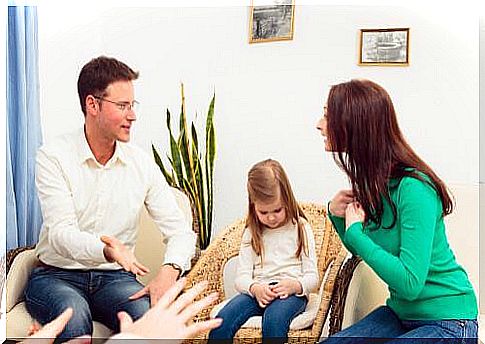How Can We Tell The Children About Our Separation? – Being Parents

Living with a separation is a very difficult experience for parents and for children. Therefore, one of the most complicated times is to tell children about our separation. Indeed, it causes a wide range of emotions: anger, sadness, pain, guilt and fear, among others.
Telling the children the news is really difficult. Indeed, as a mother, you are concerned about their reactions, their feelings and their position in relation to both parents.
The most important thing is to put it simply, to reassure them, to listen to them and to help them overcome the situation. If you apply a few basic principles, telling children about your separation will be much more bearable.
How can we tell the children of our separation?
-
Use simple words for the situation
The key message is that the parents made the decision to separate because they are not happy together. This would affect their life and that of the children.
So you have to make them understand that it is nicer to live in the same house when there is love. But when there is not a good relationship, it is not possible. Likewise, we must explain to them that unlike romantic relationships, family ties last a lifetime.
-
Choose the right time to announce the situation
While the decision to separate is still uncertain, there is no point in telling the children about it. They risk being disturbed. On the contrary, they will not understand anything and might think that they are responsible for the situation.
Keep in mind that they often develop a sense of omnipotence and later guilt if the parents eventually separate.
 However, when making the decision, one should not communicate the decision too late to the children. It is therefore important that they do not discover it accidentally.
However, when making the decision, one should not communicate the decision too late to the children. It is therefore important that they do not discover it accidentally.You need to be honest and take the ages of the children into account when deciding to announce to them. Young children need less detailed information, while older children do.
In any case, what is really important is to say it as simply as possible and to announce the situation when the whole family is together, regardless of the age of the children. Both young and old alike have a right to the truth. This situational awareness will help them cope better with the situation.
-
Reassure your children
Children often feel responsible for their parents’ separation. Of course, you have to tell them that your decision has absolutely nothing to do with them and that it is in no way their fault.
Also, children can easily believe that if their parents don’t love each other anymore, they won’t love them either. It is important to make them understand that they cannot be separated from their children.
This is why it is essential to reassure them about the love you feel for them and assure them that they will grow up surrounded as before, with the support of both parents.
Children need to know that their parents continue to be responsible for their education and to make decisions together. Explain that they can see their mother and father as often as they want.
Finally, you need to agree on how to organize their future life before you talk to your children about the separation. As long as there are disagreements about the custody of the children, it is best not to tell them anything.

-
Expect reactions
The decision to separate is not that of your children. They thus have all the rights to externalize their anger, their sadness and their pain. Reactions to separation vary with age. For example, children under 5 usually don’t understand the situation and think parents are trying to hurt them.
They may also experience regression in language learning, autonomy as well as eating disorders, sleep, etc. Over time, they fear abandonment and may present problems with sociability and adaptation.
As for adolescents, they can develop more serious problems. They are more likely to be able to hurt themselves.
That’s why you need to pay attention to them when they tell you how they feel, without minimizing their feelings or avoiding the topic. Rather, offer to answer all their questions and doubts. The discussion space must remain open to respect their emotions.
In conclusion, the refusal of separation on the part of the children is linked to the reaction of the parents. If the parents think positively during the separation process, it will be less dramatic for the children. They will thus be able to have more confidence in their own adaptability.









